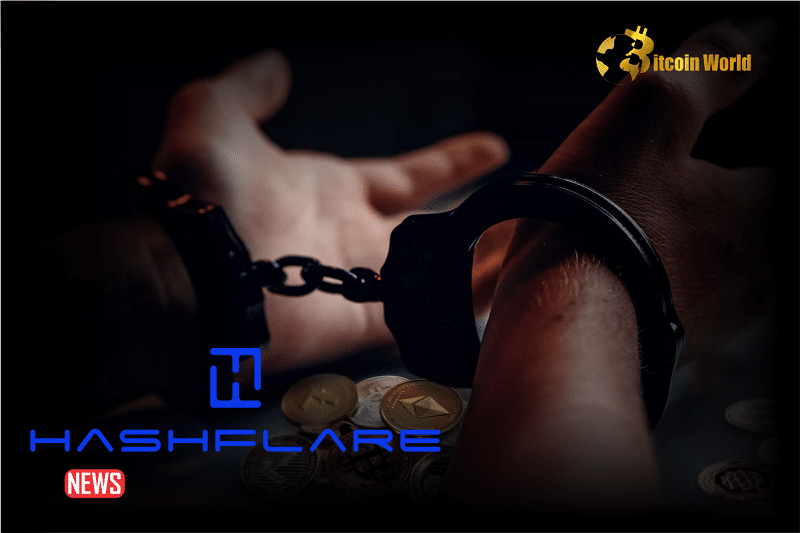Hold onto your hats, crypto enthusiasts! The rollercoaster saga of HashFlare founders, Ivan Turogin and Sergei Potapenko, just took another dramatic turn. After a legal tug-of-war, Estonia has finally given the green light for their extradition to the United States. Why is this a big deal? Well, we’re talking about a staggering $575 million cryptocurrency Ponzi scheme, allegations of defrauding countless investors, and a story that’s got more twists than a crypto price chart during a bull run. Let’s dive into the details of this high-stakes extradition drama.
Estonia Says ‘Yes’ to US Extradition Request: What Changed?
Remember back in November 2023 when the Tallinn court pumped the brakes on the extradition? They raised concerns about whether Estonia had dug deep enough into the case. Fast forward to now, and it seems the Estonian Ministry of Justice has done their homework. They’ve reviewed everything, double-checked the evidence, and concluded that, yes, there’s enough to justify sending Turogin and Potapenko to the US to face the music.
Here’s a quick rundown of the key developments:
- Initial Block: The Tallinn court initially blocked the extradition, citing insufficient investigation.
- Ministry Review: Estonia’s Ministry of Justice conducted a comprehensive review of the extradition request.
- Sufficient Evidence Found: The Ministry determined there is now enough evidence to proceed with extradition.
- Fundamental Rights Considered: They also ensured extradition wouldn’t disproportionately infringe on the founders’ rights.
- Extradition Approved: Estonia has now approved the extradition to the United States.
So, while the Tallinn court initially wanted more scrutiny, the Ministry of Justice is now confident in the case against the HashFlare founders. This decision marks a significant step forward in the US Department of Justice’s (DoJ) pursuit of justice in this complex crypto fraud case.
See Also: BEWARE: The X Account Of Algorand Foundation CEO Has Been Hacked
What Exactly Are HashFlare Founders Accused Of? The $575 Million Question
Let’s get down to the nitty-gritty. What did Turogin and Potapenko allegedly do to land themselves in this extradition hot seat? The US authorities paint a picture of a sophisticated cryptocurrency Ponzi scheme orchestrated through HashFlare and another venture called Polybius.
Here’s a breakdown of the allegations:
- HashFlare: Cloud Mining Deception: HashFlare, marketed as a cloud mining service, allegedly sold fraudulent equipment rental contracts. Victims were promised returns from cryptocurrency mining, but the reality, according to the DoJ, was far from it.
- Polybius: The Crypto Bank Mirage: Investors were also encouraged to pour funds into Polybius, a crypto bank project that seems to have been more of a mirage than a genuine financial institution.
- Ponzi Scheme Operation: The US DoJ claims both HashFlare and Polybius operated as Ponzi schemes. This means new investor money was likely used to pay off earlier investors, creating a facade of profitability while the founders allegedly lined their pockets.
- Massive Money Laundering: Here’s where the scale of the alleged fraud becomes truly eye-watering. Turogin and Potapenko are accused of laundering a staggering $575 million of client funds through a network of shell companies.
- Luxury Spending Spree: Where did all that money go? The indictment suggests it fueled a lavish lifestyle, with funds allegedly used to purchase real estate and luxury cars.
In essence, the allegations paint a picture of Turogin and Potapenko as masterminds behind a complex scheme that lured investors with the promise of crypto riches, only to allegedly defraud them on a massive scale.
Extradition Timeline: When Will They Face US Justice?
Estonia’s approval is a major hurdle cleared, but the extradition process isn’t exactly an overnight express. While the approval is in place, the exact timeline for when Turogin and Potapenko will be physically handed over to US authorities remains shrouded in some uncertainty.
Why the delay? Extradition involves a series of legal and administrative steps. Think of it as a carefully choreographed dance between legal systems. There are procedures to follow, paperwork to finalize, and logistical arrangements to be made. It’s a process that, by its nature, takes time.
For now, we’ll have to wait and see how quickly these steps unfold. What is clear is that the wheels of justice are turning, albeit at a measured pace.
The Bigger Picture: Global Crypto Crime and International Cooperation
This case is more than just about HashFlare and its founders. It shines a spotlight on the growing issue of cryptocurrency-related crime on a global scale. The fact that the US DoJ pursued this case, leading to arrests in Estonia and now extradition approval, underscores the international nature of these crimes and the increasing collaboration between nations to combat them.
As cryptocurrency becomes more mainstream, so too does the sophistication of related scams and fraudulent schemes. This case serves as a stark reminder of the risks involved in the crypto space and the importance of vigilance, due diligence, and robust international law enforcement cooperation.
In Conclusion: Justice on the Horizon?
Estonia’s decision to extradite Ivan Turogin and Sergei Potapenko is a significant development in the HashFlare saga. It signals a strong commitment to international cooperation in tackling cryptocurrency fraud and sends a clear message that borders are no barrier to justice in the digital age. While the extradition timeline remains unclear, the approval itself is a victory for the US Department of Justice and, potentially, for the victims of the alleged $575 million Ponzi scheme. The crypto world, and indeed the wider financial world, will be watching closely as this high-profile case unfolds, seeking to understand the full implications and lessons learned from the HashFlare saga.
Disclaimer: The information provided is not trading advice, Bitcoinworld.co.in holds no liability for any investments made based on the information provided on this page. We strongly recommend independent research and/or consultation with a qualified professional before making any investment decisions.



